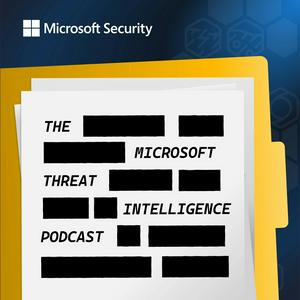63 episodios
- In this episode of the Microsoft Threat Intelligence Podcast, host Sherrod DeGrippo is joined by Microsoft security researchers Megan Stalling and Anna Seitz to examine how financially motivated threat actors are using familiar, low-complexity techniques to drive real-world impact across the financial services sector.
They examine Storm-0727, a financially motivated threat actor targeting cryptocurrency, financial services, and government entities, highlighting how simple techniques like financial-themed lures, macro-enabled documents, and credential theft allow attackers to quietly establish and maintain access. The conversation then expands to broader financial-services threat trends, including business email compromise, ransomware with data extortion, phishing-as-a-service, and why social engineering and unpatched vulnerabilities continue to succeed even in mature security environments.
In this episode you’ll learn:
How credential theft helps attackers maintain persistence
Why social engineering works even in well-secured environments
How Storm-0727 targets financial services and cryptocurrency organizations
Some questions we ask:
What happens after a victim opens a macro-enabled document used by Storm-0727?
How are phishing as a service platforms changing the threat landscape?
What major threat trends are currently shaping the financial services sector?
Resources:
View Megan Stalling on LinkedIn
View Anna Seitz on LinkedIn
View Sherrod DeGrippo on LinkedIn
Related Microsoft Podcasts:
Afternoon Cyber Tea with Ann Johnson
The BlueHat Podcast
Uncovering Hidden Risks
Discover and follow other Microsoft podcasts at microsoft.com/podcasts
Get the latest threat intelligence insights and guidance at Microsoft Security Insider - In this episode of the Microsoft Threat Intelligence Podcast, host Sherrod DeGrippo is joined by security researcher Crane Hassold and Digital Defense Report lead Chloe Mesdaghi for a grounded, practitioner-led discussion on where artificial intelligence actually stands today. Moving beyond hype and fear-driven narratives, the conversation examines how AI is realistically being used by threat actors, where its impact is often overstated, and why defenders currently stand to gain the most from AI-driven tooling.
The episode explores AI’s strengths in detection, triage, and workflow acceleration, the psychology and incentives that shape attacker behavior, and emerging risks such as prompt injection and AI systems becoming direct attack targets.
In this episode you’ll learn:
Where AI is genuinely being used in real-world cyber operations
Why AI systems themselves are becoming attractive targets for attackers
How AI is accelerating defensive workflows like detection engineering and threat triage
Some questions we ask:
What does AI do well right now, and where has it been overpromised?
Does AI shift the balance of power toward defenders or attackers?
Why are prompt injection and agent manipulation such serious concerns?
Resources:
View Chloé Messdaghi on LinkedIn
View Crane Hassold on LinkedIn
View Sherrod DeGrippo on LinkedIn
Related Microsoft Podcasts:
Afternoon Cyber Tea with Ann Johnson
The BlueHat Podcast
Uncovering Hidden Risks
Discover and follow other Microsoft podcasts at microsoft.com/podcasts
Get the latest threat intelligence insights and guidance at Microsoft Security Insider
The Microsoft Threat Intelligence Podcast is produced by Microsoft, Hangar Studios and distributed as part of N2K media network. - To kick off Season 3 of Microsoft Threat Intelligence Podcast, host Sherrod DeGrippo is joined by Microsoft security researchers Anna Seitz and Jonathan Checchi.
Our guests examine two developments shaping today’s threat landscape: the cloud-native evolution of ransomware group Storm-0501 and the SesameOp backdoor’s abuse of trusted AI platforms for stealthy command-and-control. The discussion highlights how identity, hybrid-cloud pivot points, and federated authentication enable high-impact attacks without traditional malware, and why policy-compliant platform abuse is becoming harder to detect.
Sherrod, Anna, and Jonathan provide guidance for defenders around enforcing MFA, tightening conditional access and identity controls, monitoring across cloud and on-prem environments, and partnering with platform providers to disrupt emerging attacker tradecraft.
In this episode you’ll learn:
What happens when threat actors gain control of highly privileged identities
Why monitoring identity behavior is as critical as monitoring endpoints
How attacker tactics are adapting to environments that blend cloud and on-prem systems
Some questions we ask:
What does recent threat activity tell us about where the landscape is headed?
How is Storm-0501 using federated authentication in their operations?
What should security teams focus on as AI becomes more integrated into systems?
Resources:
View Anna Seitz on LinkedIn
View Sherrod DeGrippo on LinkedIn
Related Microsoft Podcasts:
Afternoon Cyber Tea with Ann Johnson
The BlueHat Podcast
Uncovering Hidden Risks
Discover and follow other Microsoft podcasts at microsoft.com/podcasts
Get the latest threat intelligence insights and guidance at Microsoft Security Insider
The Microsoft Threat Intelligence Podcast is produced by Microsoft, Hangar Studios and distributed as part of N2K media network. - In this episode of the Microsoft Threat Intelligence Podcast, host Sherrod DeGrippo is joined by security researchers Geoff McDonald and JBO to discuss Whisper Leak, new research showing that encrypted AI traffic can still unintentionally reveal what a user is asking about through patterns in packet size and timing.
They explain how LLM token streaming enables this kind of side-channel attack, why even well-encrypted conversations can be classified for sensitive topics, and what this means for privacy, national-level surveillance risks, and secure product design. The conversation also walks through how the study was conducted, what patterns emerged across different AI models, and the steps developers should take to mitigate these risks.
In this episode you’ll learn:
Why packet sizes and timing patterns reveal more information than most users realize
How user-experience choices like showing streamed text create a larger attack surface
The difference between classic timing attacks and the new risks uncovered in Whisper Leak
Resources:
View JBO on LinkedIn
View Geoff McDonald on LinkedIn
View Sherrod DeGrippo on LinkedIn
Learn more about Whisper Leak
Related Microsoft Podcasts:
Afternoon Cyber Tea with Ann Johnson
The BlueHat Podcast
Uncovering Hidden Risks
Discover and follow other Microsoft podcasts at microsoft.com/podcasts
Get the latest threat intelligence insights and guidance at Microsoft Security Insider
The Microsoft Threat Intelligence Podcast is produced by Microsoft, Hangar Studios and distributed as part of N2K media network. - In this episode of the Microsoft Threat Intelligence Podcast, host Sherrod DeGrippo is joined by Matt Duncan, Vice President of Security Operations and Intelligence at the North American Electric Reliability Corporation’s E-ISAC, to explore the cyber threats targeting the North American power grid. Matt breaks down why the grid remains resilient despite increasing pressure from nation-states, cybercriminals, and hacktivists, how AI is lowering the barrier of entry for attackers, and why OT systems and interconnected devices present unique risks.
He also highlights real success stories, the value of large-scale grid exercises, and how strong collaboration and a focus on foundational security practices help defenders keep power flowing safely and reliably.
In this episode you’ll learn:
How severe weather events trigger heightened cyber-readiness across utilities
What motivates hacktivist groups and how their tactics differ from other threat actors
Why outdated equipment and legacy systems remain such attractive targets
Some questions we ask:
Are you seeing more educated and capable OT-focused adversaries now?
How do you work with policymakers to help them understand these threats?
If you could eliminate one misconception about securing the grid, what would it be?
Resources:
View Matt Duncan on LinkedIn
View Sherrod DeGrippo on LinkedIn
Learn more about E-ISAC
Related Microsoft Podcasts:
Afternoon Cyber Tea with Ann Johnson
The BlueHat Podcast
Uncovering Hidden Risks
Discover and follow other Microsoft podcasts at microsoft.com/podcasts
Get the latest threat intelligence insights and guidance at Microsoft Security Insider
The Microsoft Threat Intelligence Podcast is produced by Microsoft, Hangar Studios and distributed as part of N2K media network.
Más podcasts de Economía y empresa
Podcasts a la moda de Economía y empresa
Acerca de Microsoft Threat Intelligence Podcast
Join us to hear stories from the Microsoft Threat Intelligence community as they navigate the ever-evolving threat landscape - uncovering APTs, cybercrime gangs, malware, vulnerabilities, and other weird and cool tools and tactics in the world of cyber threats. Featuring tales of innovation, teamwork, and cyber espionage, tune in to hear in-depth analyses of Microsoft's influence on the threat landscape and behind the scenes stories from the tireless researchers and analysts that take part. This enthralling and insightful podcast is delivered in a casual, conversational style that transports you to the frontlines of cyber defense.
Sitio web del podcastEscucha Microsoft Threat Intelligence Podcast, Whitepaper y muchos más podcasts de todo el mundo con la aplicación de radio.net

Descarga la app gratuita: radio.net
- Añadir radios y podcasts a favoritos
- Transmisión por Wi-Fi y Bluetooth
- Carplay & Android Auto compatible
- Muchas otras funciones de la app
Descarga la app gratuita: radio.net
- Añadir radios y podcasts a favoritos
- Transmisión por Wi-Fi y Bluetooth
- Carplay & Android Auto compatible
- Muchas otras funciones de la app


Microsoft Threat Intelligence Podcast
Escanea el código,
Descarga la app,
Escucha.
Descarga la app,
Escucha.

































